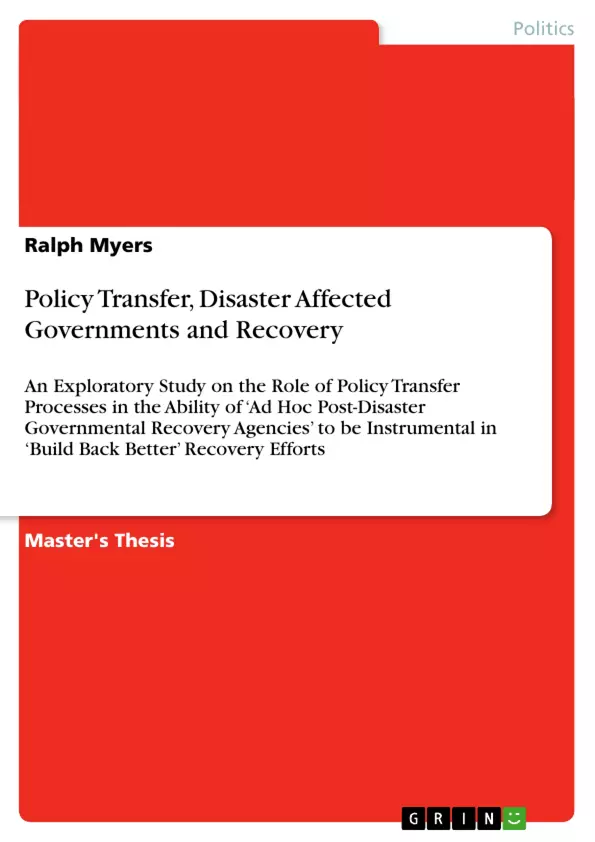Since the humanitarian response to the 1994 Rwanda genocide, there has been a growing body of literature on quality and accountability in humanitarian action. One of the most recent trends has been a focus on ‘humanitarian cooperation’ between the governments of disaster affected countries and other humanitarian actors. The research presented in this paper builds on this trend by comparing two governmental recovery agencies, namely the Interim Haiti Recovery Commission (IHRC) and the Aceh Nias Rehabilitation and Reconstruction Agency (BRR).
Through a review of the literature on policy transfer, the creation of an integrated conceptual/analytical framework for policy transfer and the application of Lijphart’s ‘comparative method’, the research attempts to identify both whether or not policy transfer occurred between the two contexts, as well as the possible causes for the difference in both agencies’ ability to ‘build back better’. The outcomes of the research are then used to suggest possible areas of future research and related hypotheses.
Inhaltsverzeichnis (Table of Contents)
:- Einleitung
- Von der Inklusion zur Exklusion: Der Wandel der Bildung
- Die Anfänge der Inklusion
- Die Krise der Inklusion
- Die Entstehung exklusiver Bildungssysteme
- Exklusion in der Praxis: Eine Fallstudie
- Die BiLieF-Studie
- Methoden der Datenerhebung
- Ergebnisse und Interpretation
- Die Folgen von Exklusion
- Soziale Ungleichheit
- Bildungsarmut
- Individuelle Nachteile
- Zukunftsperspektiven
- Neue Konzepte für inklusive Bildung
- Politische Handlungsbedarfe
- Die Rolle der Gesellschaft
Zielsetzung und Themenschwerpunkte (Objectives and Key Themes)
: This work aims to analyze the transition from inclusive to exclusive education systems. By examining the historical context, the study focuses on identifying the factors leading to this shift and explores its implications for social equity and individual development.- The historical evolution of inclusive education
- The challenges and limitations of inclusion
- The emergence of exclusive education models
- The consequences of exclusion for individuals and society
- Potential solutions and future perspectives for inclusive education
Zusammenfassung der Kapitel (Chapter Summaries)
: This section will include summaries of the chapters in the work, excluding the conclusion.Schlüsselwörter (Keywords)
: This work explores key concepts related to inclusive and exclusive education, empirical research findings, and studies such as the BiLieF project. The main keywords include: inclusive education, exclusive education, social equity, educational disadvantage, BiLieF project, empirical research, and social inequality.Frequently Asked Questions
What is the main focus of this study?
The study analyzes the transition from inclusive to exclusive education systems and its implications for social equity and individual development.
What is the BiLieF project?
The BiLieF study is an empirical research project used as a case study to examine exclusion in educational practice and interpret data on educational disadvantage.
What are the consequences of educational exclusion?
Exclusion leads to increased social inequality, educational poverty, and significant individual disadvantages for those affected.
How has inclusive education evolved over time?
The work explores the historical evolution from the early stages of inclusion to the current crisis and the emergence of more exclusive models.
What solutions are proposed for the future of education?
The paper discusses new concepts for inclusive education, the role of society, and specific political actions needed to restore equity.
- Citar trabajo
- Ralph Myers (Autor), 2011, Policy Transfer, Disaster Affected Governments and Recovery, Múnich, GRIN Verlag, https://www.grin.com/document/215494



